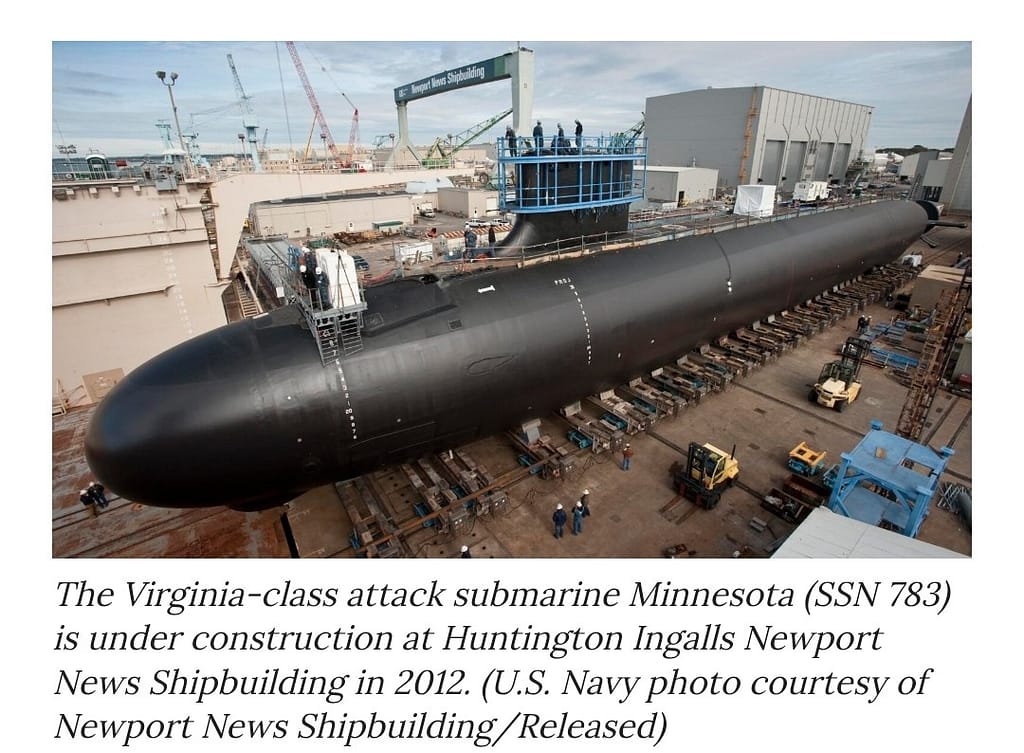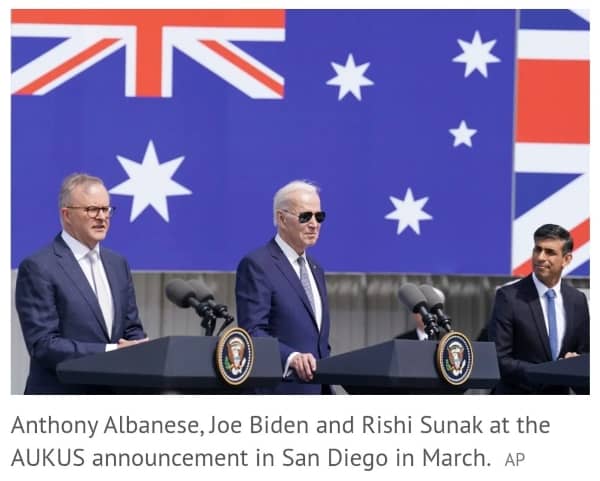Written by Richard Staples, April 15th 2025.
Another federal election rapidly approaches. Unlike at the last two, AUKUS has become a hot issue. Recent polling has shown that the percentage of voters that think AUKUS would enhance our national security has dropped from 45℅ two years ago to 37℅.

This is despite an avalanche of material from the AUKUS cheersquad. Masquerading as defence analysis, most of this is shameless promotional material aimed at an audience that is mostly unburdened by any technical knowledge about submarines, or to provide talking points for those with vested interest. It is repeated ad nauseam that nuclear subs are more modern, faster, more lethal, potent, formidable, and a dozen other things. Above all, we see repeated the claim that they are more stealthy. I will come back to that shortly. Meanwhile elements of the media – especially the West Australian and the Adelaide Advertiser – churn out laughable predictions of economic boom, turbocharged by shipbuilding and related defence activity. The Government has weighed in, paying three retired US naval brass $1 million apiece to furnish reports concluding (predictably) that nuclear submarine acquisition is a splendid idea. Defence Minister Marles has grimly stuck to the songsheet, and apart from a failed attempt to debate AUKUS at last year’s ALP Conference, and the Labor Against War social media group being active, most Labor MPs (including the incumbent Member for Richmond, Justine Elliot) are silent on the issue.
So, let’s take a few steps back. Two years before the AUKUS announcement, Hugh White laid out a cool-headed approach in his 2019 book ‘How to Defend Australia’. In it he stressed the importance of deciding what we want our defence forces to do prior to making procurement decisions. He systematically looks at our strengths, weaknesses and natural geographic advantage and comes to the conclusion that a strategy of maritime denial – convincing any would-be aggressor that armed invasion would result in unacceptable losses – is a vital component of national security. This is a welcome change, since a number of major weapons platforms have been bought without clear rationale as to how they fit into a broader strategy. The F35 Joint Strike Fighter and the two Helicopter Dock Vessels are cases in point. Above all a drift towards ever more close ‘interoperability’ with US forces has been going on at least since the Howard years.
However recently a powerful conversation has emerged that, perhaps for the first time in a generation, looks at our overall defence strategy & the assumptions underlying it. This has coalesced into a consensus that independent national security is achievable.
To understand why nuclear submarines are unsuitable as a key strategic element we need to look more closely at their strengths & weaknesses.
Any submarine’s principal quality is stealth. Sound travels better in water than in air, and tracking subs depends heavily on listening either for sounds generated (passive sonar) or signals reflected off them (active sonar). Nuclear & conventional subs are similarly vulnerable to active sonar, but both types have strategies to minimise detection. The external hull can be covered with ‘anechoic’ tiles. Some newer designs have a slab-sided rather than a rounded external hull, after the fashion of a stealth warplane. But the big problem with nuclear submarines is they are inherently noisy. The nuclear reactor can’t just be switched off – the reactor itself is silent, but the associated pumps, turbines & plumbing emit constant noise. On the other hand, a diesel-electric sub can turn everything off & even lie on the bottom if required. It may enjoy further advantage due to the nature of its deployment. It can operate in shallower waters, like the littoral seas on a continental shelf. In these environments, sonar is impeded due to its signal bouncing off the sea bottom, or being refracted by different temperatures at different depths (thermoclines) or salinity (haloclines).
Despite all the hubris attached to nuclear subs, conventional boats have demonstrated their superior stealth several times in war games by ‘sinking’ aircraft carriers. In 1999, during naval exercises off Hawaii, the veteran Oberon class sub HMAS Onslow ‘sank’ the USS Carl Vinson. In 2004 a Swedish sub under lease to the US Navy bagged the USS Ronald Reagan, and more recently one of our Collins class boats scored the USS Abraham Lincoln.
Former Senator and submariner Rex Patrick has been active in criticism of the AUKUS plan. He points out that for a ‘mere’ $30 billion, we could acquire 20 state-of-the-art conventional subs. There are some impressive designs on offer from Germany, Sweden, France Japan & South Korea. Then there are UUVs (Uncrewed Underwater Vessels).
The next Australian Government should cancel AUKUS . Not in retaliation for trade sanctions. Not because the US President is a dangerous psychopath. But simply because there are much cheaper and more effective ways to ensure our national security.
Richard Staples was a Greens Councillor on Byron Shire between 1995 and 2012. He now researches and writes on energy and defence issues.
